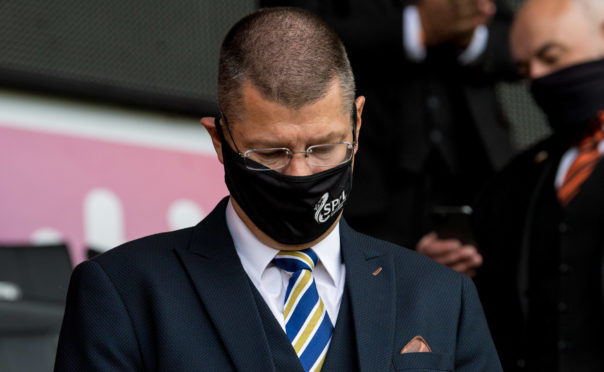
Say what you like about Scottish football – and plenty do – but it is tough to beat for plot twists.
No one could possibly have anticipated that Rangers would go into this afternoon’s match at Livingston looking to establish an eight-point lead over Celtic.
Or, indeed, that extending their record to a perfect four wins out of four would, in the process, hoist them 12 points clear of Aberdeen.
Celtic, the relentless 10-in-a-row chasers, Aberdeen, most people’s tip to be best-of-the-rest, most of the time.
The story is, of course, not that simple.
Neither have forfeited points as a result of their players’ much-publicised rule breaking, despite the calls for the SPFL to exact that punishment.
Rather, the two clubs find themselves denied the opportunity to collect them in the correct order.
The Dons have had to miss three of their scheduled fixtures, the Hoops two.
With the 2020-21 campaign already jam-packed as a direct result of the impact of Covid-19, it will be long enough before they are able to clear the decks.
“Points on the board” is a cliché for good reason. Positive momentum builds, while chasing produces its own pressure.
The SPFL will not mind the clubs being disadvantaged in this way.
The protocol breaches have threatened the entire season, and the central plot of the 2020-21 Premiership is the need to get the thing completed.
Clubs, supporters, sponsors and broadcasters demand nothing less.
The chaos that ensued when the 2019-20 season was brought to a shuddering halt in March, never to be revived, is gone but not forgotten.
You need only look at the fact Hearts and Partick Thistle chose to try to fight their respective relegations in the law courts to see the hurt caused by calling league positions final, even though the leagues had not been finalised.
Celtic can argue, with good cause, that the 13-point lead they held over Rangers with eight games remaining (the Light Blues had a game in hand) was a strong indicator that they would have gone on and finished on top.
They had, after all, only lost twice in the 30 league fixtures before lockdown.
Arithmetically, though, it was possible for their rivals to catch them, and fans of Steven Gerrard’s team will never gloss over that fact.
SPFL chief executive Neil Doncaster was vocal in his criticism of Celtic’s Boli Bolingoli and, indeed, the “Aberdeen Eight”.
Their “thoughtless and selfish” behaviour had, he said, jeopardised the enormous efforts made by thousands to get the Scottish game up and running.
Looking in, the feeling persists he was reacting as much to the Scottish Government’s response to events as to the events themselves.
A persistent criticism of the SPFL during all the muddle and confusion of lockdown was the lack of clear leadership at the top.
A handful of weeks into the new campaign, little has changed.
In the wake of the Bolingoli controversy, we are told the SPFL Board is set to ratify a range of punishments for players who breach Covid-19 regulations.
These could include fines, bans, and possibly, even, community service.
The key words there are “in the wake of”.
They bring to mind the image of a couple of horse-grooms scrambling to shut the stable doors, even as the Grand National field is bolting all around them.
The First Minister, Nicola Sturgeon, turned to an even easier-to-understand analogy when stating that football had been given a yellow card.
Next time, it would be red, and a nation of football fans would be left in this most- testing of years without the pleasing distraction of their favourite sport to watch.
By then, it will be too late for any thought of docking points from the offending clubs for the transgressions of their players.
It would, in fact, be all over bar the shouting.
Of that, we would be guaranteed plenty, not least because – despite the events of last season – no one knows what would happen next.
If the 2020-21 campaign gets “red carded” by the government after 10 matches – and let’s hope it never happens – is it automatically null and void?
What about after 20 matches?
Will the team at the top of the table automatically be champions? Or, as happened last season, will an average points-per-game method be used?
And should another player, or players, step out of line this week, and the first minster brandishes her promised red card, will a Rangers’ win at Livingston this afternoon become the result that stopped 10-in-a-row?
Far-fetched, I know.
But by now, the SPFL should have publicised a list of guidelines to cover every eventuality, and avoid the rancour that threatened to tear the Scottish game apart this summer.
As much as public health trumps all, the outcome of this season’s Premiership is not suddenly going to become a matter of no consequence to the hundreds of thousands who relish the soap opera that is the Scottish game.

Enjoy the convenience of having The Sunday Post delivered as a digital ePaper straight to your smartphone, tablet or computer.
Subscribe for only £5.49 a month and enjoy all the benefits of the printed paper as a digital replica.
Subscribe